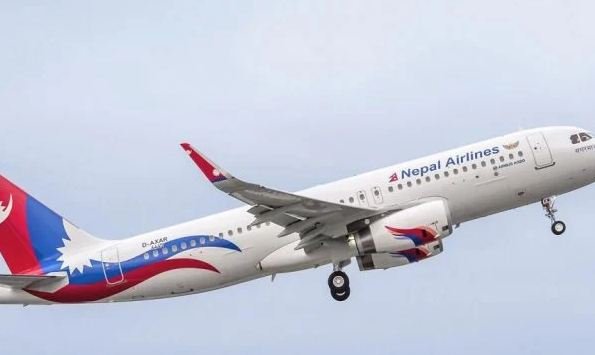Government's delay in addressing NAC pilots' demands leads to strike

Kathmandu, November 25 — Two flights of Nepal Airlines Corporation faced issues on Sunday due to the pilot strike. Flights to Mumbai and Dubai, which were scheduled to depart from Tribhuvan International Airport, were delayed due to the strike.
Due to the absence of some pilots, citing reasons including health, the Mumbai flight was delayed by 8 hours, and the flight to Dubai, scheduled for the previous day, was canceled. Passengers on these flights were sent on another flight on Monday, as informed by the corporation's spokesperson, Manoj Kumar Sah.
Currently, there are 43 pilots in the corporation, of which 8 are on contract while the rest are permanent pilots. The permanent pilots are protesting because their salaries are lower than those pilots on contract.
Earlier, pilots had warned of a strike, and the Ministry of Culture, Tourism, and Civil Aviation had assured them that their demands would be met within the month of Kartik. However, since their demands were not addressed even after a week of the given deadline, the pilots went on strike.
The ministry has already sent a proposal to the Ministry of Finance to revise the staff regulations to increase their benefits, but the proposal is still pending due to the finance ministry’s lack of approval, according to spokesperson Sah.
Pilot salaries and demands
Currently, permanent pilots at the corporation earn around 600,000 to 700,000 Nepali Rupees per month. Additionally, they have job security until the age of 58 and retirement benefits. However, the contract pilots, who are paid 3 to 4 lakh more than permanent pilots, do not have job guarantees or retirement benefits. The permanent pilots are protesting, demanding that their salaries not be less than those of contract pilots.
If the service benefits of the pilots are increased as per their demands, it is expected to increase the corporation's monthly expenditure by over 10 million rupees. This is one of the reasons why the Ministry of Finance has been hesitant to approve the proposal.
The spokesperson emphasized that the disruption in essential services could harm the corporation’s reputation and lead to financial losses, and he stressed that fulfilling the pilots' demands and making a recommendation to the Ministry of Finance would be more appropriate than suspending services.
Cabin crew demands
Earlier, the cabin crew had also been protesting, demanding an increase in the retirement age. The government had reached an agreement with them in the third week of Ashoj, raising the retirement age from 45 to 50 years, and it was also agreed to improve the pilots' service benefits.
Since the cabin crew’s issue did not involve significant additional expenses, it did not require approval from the Ministry of Finance. However, the delay in addressing the pilots' demands is due to the need for finance ministry approval, as the increased service benefits would raise costs.
Engineers working within the corporation have also been demanding better service benefits, though this was not included in the proposal sent to the ministry. Currently, engineers' salaries are 40% lower than those in private sector development companies, but despite this, they have been cooperative, considering the corporation's situation and its role in providing essential services.
What is the regulator doing about the flight disruptions?
While passengers have faced difficulties due to the flight disruptions, the regulator, the Civil Aviation Authority of Nepal (CAAN), has not taken any action so far. The Chief of Tribhuvan International Airport, Jagannath Niroula, mentioned that they have instructed the corporation to resolve its internal issues and operate flights on time. He stated that other matters are handled by the central office.
Deputy Director of CAAN, Gyanendra Bhul, also mentioned that the regulator does not have the jurisdiction to intervene in the corporation's internal issues. He added that their responsibility is to ensure flight safety, and any internal issues regarding management are outside their scope. However, if problems persist, necessary actions may be taken.
After the pilots went on strike, the Ministry of Culture, Tourism, and Civil Aviation called the representatives of the striking pilots to the ministry. However, since the matter falls under the Ministry of Finance, the ministry officials have stated that there is no option but to request the pilots to suspend their strike and resume services for now.









Leave Comment